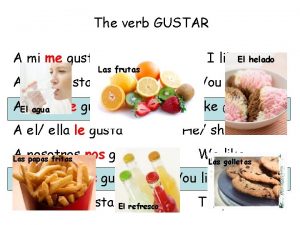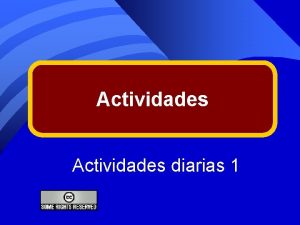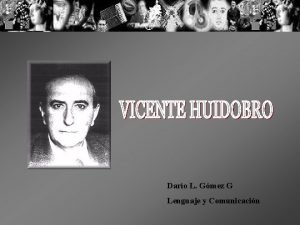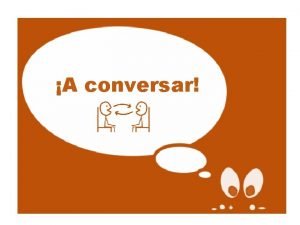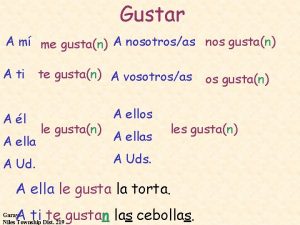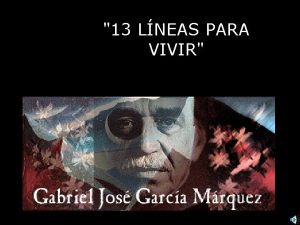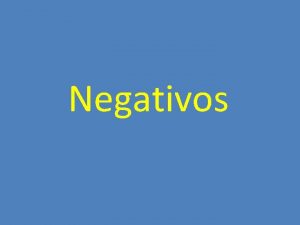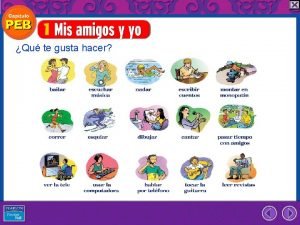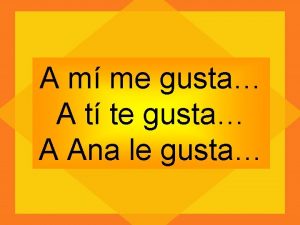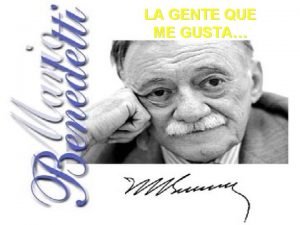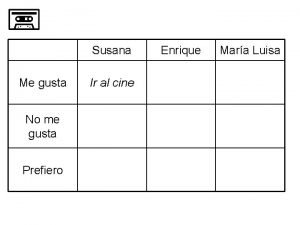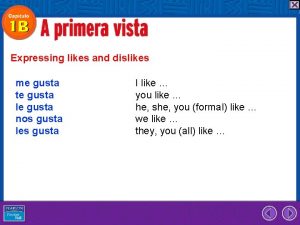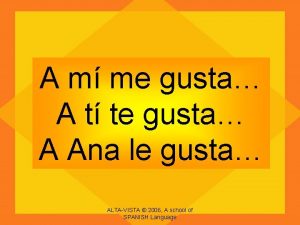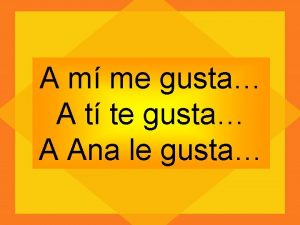me gusta me encanta use me gusta to



















- Slides: 19

me gusta me encanta use me gusta to say you like something use me encanta to say you love something

LITERALLY me gusta –“pleasing to me” me encanta “delighting to me” Ø Me gusta el café, pero me encanta el café helado. Ø I like coffee but I love iced coffee. (Coffee is pleasing to me but iced coffee is delighting to me. )

• DO NOT use subject pronouns with gustar • You cannot say “Yo gusta” • Instead you use indirect object pronouns

Indirect Object Pronouns are used with gustar: me nos te os le les

• Indirect Object Pronouns must always go directly in front of the verb “gustar” & “encantar” • ¿Te gusta la pizza? • Sí, me gusta la pizza.

me gusta(n) I like te gusta(n) you like le gusta(n) he, she, you like nos gusta(n) we like os gusta(n) you all like les gusta(n) they, you all like

• When talking about something you or someone else likes or loves, you use a noun. • If the noun is singular use : GUSTA + NOUN ¿Te gusta el libro? Sí, me encanta el libro.

You must include the article with the noun (el, la, los, las) Me gustan las fresas. I like strawberries. Me encantan las galletas. I love cookies.

• When talking about an activity use the singular form “gusta”/”encanta” plus an infinitive. • gusta/encanta + infinitive = to like/love to do something. • Me gusta dibujar. • ¿Te gusta nadar? • A él le gusta estudiar. • A ella le encanta estudiar.

If you don’t like something you say No me gusta(n). If you don’t like something at all say No me gusta(n) nada. NO will always come before the indirect object pronoun. No me gustan los deportes. A ellos no les gusta la clase. A ella no le gusta nada el libro.

IF THE NOUN IS PLURAL USE: GUSTAN + NOUN • No me gustan los libros. For multiple objects, you also use gustan. • Me gustan el libro y la película. • Note: The verb will be singluar When using “o. ” • ¿Qué te gusta más, el libro o la película?

• If you are using “le” or “les, ” you may need to clarify about whom you are speaking. • A + the person’s name or pronoun. A Marta le gusta la clase. A María y Juan les gustan los libros.

• In a statement, it comes in the beginning: • A los estudiantes les gusta estudiar. • In a question, the clarification comes at the end of the sentence. • ¿Le gusta la comida mexicana a Roberto?

No me gusta el cereal. I don’t like cereal. No me gusta nada el yogur. I don’t like yogurt at all. No me gustan los plátanos. I don’t like bananas. No me gustan nada las fresas. I don’t like strawberries at all.

• You can also use pronouns to put emphasis on what is being said: • A mí me gusta la pizza. • A ti te gustan las papas fritas.

• Other than “a mí” and “a ti, ” use the regular subject pronouns when adding clarification. • A mí (no) me gusta(n) – (not) pleasing to me • • • A ti (no) te gusta(n) – (not) pleasing to you (familiar) A usted (no) le gusta(n) – (not) pleasing to you (polite) A él (no) le gusta(n) – (not) pleasing to him A ella (no) le gusta(n)- (not) pleasing to her A nosotros (no) nos gusta(n)- (not) pleasing to us A vosotros (no) os gusta -(not) pleasing to you all (familiar, Spain) • A ustedes + (no) les gusta(n)- (not) pleasing to you all • A ellos/ellas + (no) les gusta(n)- (not) pleasing to them

To ask who likes something use: ¿A quién…? or ¿A quiénes…? • A quién + (no) le gusta(n) • A quiénes + (no) les gusta(n) • ¿A quién le gusta dibujar? • A Patricia le gusta dibujar. • ¿A quiénes les gustan las clases? • A nosotros nos gustan las clases.

To say what someone “would like to do” you use gustaría + infinitive: • ¿Te gustaría ir al cine hoy? • Would you like to go to the movies today? • Me gustaría estudiar hoy. • I would like to study today.

• When you want to say that someone loves something or loves to do something use: encanta / encantan • Me encanta bailar. • Me encantan los deportes. *Uses the same rules as gusta / gustan *Not used to say someone loves a person *Not used in the negative
 To use me gusta and me encanta to talk about
To use me gusta and me encanta to talk about Odio me gusta esta bien
Odio me gusta esta bien A mi me gusta a mi me encanta dios
A mi me gusta a mi me encanta dios A mi me gusta chart
A mi me gusta chart Actividades que me gusta realizar
Actividades que me gusta realizar Ave canta suave que tu canto encanta
Ave canta suave que tu canto encanta Encanta es un sustantivo
Encanta es un sustantivo How you use ict today and how you will use it tomorrow
How you use ict today and how you will use it tomorrow Las cosas de la clase
Las cosas de la clase A nosotros no nos gusta
A nosotros no nos gusta Me gusta vivir lo bueno
Me gusta vivir lo bueno La gente que me gusta mario benedetti
La gente que me gusta mario benedetti Alicia es una estudiante de __
Alicia es una estudiante de __ éric está deprimido.
éric está deprimido. Que tipo de comida te gusta
Que tipo de comida te gusta No me gusta ni bailar ni cantar
No me gusta ni bailar ni cantar No me gusta la luz
No me gusta la luz Capitulo 1a que te gusta hacer answers
Capitulo 1a que te gusta hacer answers Me gusta la gente sincera
Me gusta la gente sincera Gusta i
Gusta i



